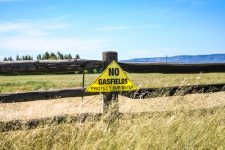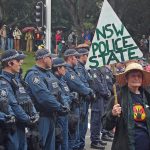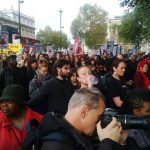Trio Not Guilty of Breaking Anti-Protest Laws

Mudgee Local Court magistrate David Day has dismissed the proceedings against two women and a man who were arrested and charged last year while protesting against the expansion of the Wilpinjong coal mine, near the town of Wollar where they live.
Bev Smiles, Bruce Hughes and Stephanie Luce, known as ‘the Wollar three’, were arrested and charged with ‘interfering with a mine’ under the recently amended section 201 of the Crimes Act 1900 (NSW) which carries a maximum penalty of 7 years’ imprisonment after a protest in which they were involved allegedly rendered a public road “useless” and thereby hindered the operation of equipment “belonging to a mine”.
Anti-protest package
In 2016, the NSW government enacted the Inclosed Lands, Crime and Law Enforcement Legislation Amendment (Interference) Act which amended three pieces of existing legislation to:
- Provide police with greater powers to stop, search and detain protesters and seize certain property,
- Introduce a new offence of ‘aggravated unlawful entry on inclosed lands’, and
- Greatly expand scope of the offence of ‘interfering with a mine’.
Police Powers
The new legislation introduced sections 45A, 45B and 45C into the Law Enforcement (Powers and Responsibilities) Act 2002 (‘the LEPRA’)
Section 45A makes it clear that the next two sections apply “to anything that is intended to be used to lock-on or secure a person to any plant, equipment or structure for the purpose of interfering with the conduct of a business or undertaking and that is likely to be used in a manner that will give rise to a serious risk to the safety of any person.”
Section 45B empowers police to stop, search and detain a person or vehicle without a warrant if they suspect ‘on reasonable grounds’ the presence of an item referred to in the previous section, and to seize any such item.
Section 45C provides that items seized under the division are forfeited to the state and can be destroyed or disposed of as police please.
The New South Wales Council of Civil Liberties (NSWCCL) argues that the sections are clearly aimed at arming police with the tools necessary to deter peaceful protects.
The organisation explains that the words ‘on reasonable grounds’ are extremely broad and police will use the mere presence of people at demonstrations as a pretext to arbitrarily stop and search them.
The organisation further explains that, while the words ‘will give rise to a serious risk to the safety of any person’ might appear on the surface to limit the power, police will be able to easily overcome that requirement by simply arguing, for example, that coal seam gas operations often involve ‘fracturing’ and heavy machinery which can destabilises the earth, and that the presence of protesters can create a safety risk. Such an argument can be applied to many other mining contexts.
The NSWCCL points out that the provisions are not offset by extra judicial oversight.
New offence
The legislation inserted a new offence of ‘aggravated unlawful entry on inclosed lands’ into the Inclosed Lands Protection Act 1901.
The offence is now embodied in section 4B of that Act. It prescribes a maximum penalty of $5,500 for anyone who, among other things, enters inclosed lands without permission or a reasonable excuse and while there:
(a) interferes with, or attempts or intends to interfere with, the conduct of the business or undertaking, or
(b) does anything that gives rise to a serious risk to the safety of the person or any other person on those lands.
The maximum penalty is ten times that which applies to the regular offence of entering inclosed lands.
Expanded offence
The new law expanded the scope of section 201 of the Crimes Act 1900 which prescribes a maximum penalty of 7 years’ imprisonment for ‘interfering with a mine’ by:
- Extending the offence to areas ‘associated with’ – and not just on – a mine, and
- Defining a ‘mine’ to include:
- a place at which gas or other petroleum is extracted from the ground,
- a place at which exploration for minerals, or for gas or other petroleum, is undertaken by mechanical means that disturb the ground,
- a place at which works are being carried out to enable the extraction of minerals, or of gas or other petroleum, from the ground, and
- a former mine at which works are being carried out to decommission the mine or make it safe.
The section makes it an offence to intentionally or recklessly:
- cause water to run into a mine or any subterranean channel connected to it,
- destroy, damage or obstruct any shaft, passage, pit, airway, waterway or drain of, or associated with, a mine,
- destroy, damage or render useless any equipment, structure, building, road or bridge belonging to, or associated with, a mine, or
- hinder the working of equipment belonging to, or associated with, a mine,
Indeed, this was the offence with which the Wollar three were charged.
The protest
The Wollar three were protesting against moves towards the expansion of the Wilpinjong coal mine, which is located around 320 kilometres north-west of Sydney.
Approval of the plan would enlarge the mine to within just 1.5 kilometres of the town of Wollar.
Private landowners were concerned the expansion would significantly reduce the value of their properties, increase the risk of health issues and affect their quality of life. No compensation was being offered by either the owners of the mine or by the government.
Protesters pointed out that the mine was already unbearably noisy and was causing toxic fumes and long-lasting environmental damage.
In the context of the NSW government having removed the right to appeal the merits of a decision regarding the mine to the Land and Environmental Court, Wollar residents saw no alternative but to demonstrate.
“The vested interests of mining companies are so favoured over communities that the state government not only removes our right to appeal unfair planning decisions but now threatens us with new draconian laws designed to prevent peaceful protest,” said defendant Bev Smiles.
Bruce Hughes similarly remarked, “I’ve lived in that area for 30-odd years and I just had to stand up and say no, this should not be allowed to go ahead…All I wanted was to protect my home.”
The Wollar three were amongst residents who blockaded the area leading to the mine, which led to their arrest and charge.
There efforts appeared to be in vain, as the expansion of the mine was approved a fortnight after the arrests.
The hearing
The cases proceeded to a contested hearing in the Local Court, where the defendants sought to rely on the success of a constitutional challenge led by former Greens leader Bob Brown against similar laws in Tasmania.
In that case, the High Court ruled by a majority of 6:1 that the anti-protest laws were not appropriate or proportionate for the legitimate purpose of protecting business interests, and were incompatible with the “the system of representative and responsible government that the constitution requires”.
The judgment
Magistrate Day ultimately dismissed the charges on the basis that there was insufficient evidence the road was rendered useless, as alleged.
His Honour remarked that had police charged the trio with hindering equipment “associated with” the mine rather than belonging to it, the outcome may have been different.
The validity of the laws remains unchallenged in the higher courts.







